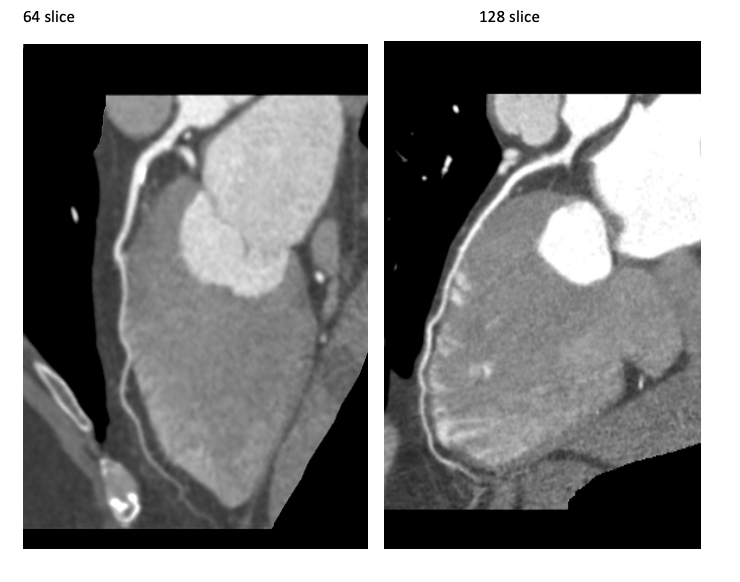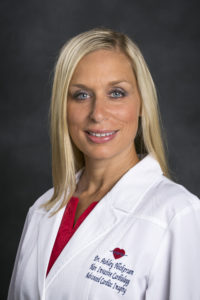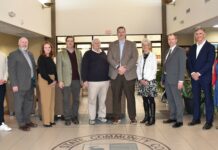
By Michelle Price
Special to the UCBJ
COOKEVILLE – Patients needing more detailed cardiac imaging can now get that testing done closer to home.
CRMC has recently completed the change from a 64-slice to a 128-slice CT scanner providing physicians a clearer and more definitive view of the heart and arteries. This month, a new MRI with a cardiac package will be added, significantly increasing the number of patients that CRMC can serve.

The cardiac imaging program was expanded when Dr. Ashley Nickerson joined Tennessee Heart in fall 2018 as the team’s “designated reader.” Since that time, the number of CTA’s – coronary angiogram imaging tests – performed has more than doubled the previous rate, saving patients the time and trouble of traveling to larger cities for these procedures. The addition of the new CT and MRI will further increase the number of patients able to receive these services closer to home.
One use for the cardiac CT is calcium scoring to allow the physician to look at the heart, without using dye, for pre-clinical coronary disease and to help tailor medical therapies to prevent heart attacks.
Cardiac imaging is used quite often for viability assessment, a procedure that tells the doctor the degree of scarring from previous heart attacks and helps determine what the next best step for patients with continuing heart issues is.
Other uses for the cardiac CT include studying structural heart issues, such as congenital heart defects and coronary anomalies, and pulmonary vein mapping, which is pre-procedural planning for ablation – a treatment for cardiac arrhythmia.
Cardiac imaging often allows patients to avoid an invasive procedure like a cardiac cath.
“In looking for coronary disease, we use it for low- to intermediate-risk patients to avoid an invasive procedure because it is very, very good at excluding disease,” explained Nickerson. “So, if there’s no disease there, you have your answer.
“We know exactly where it is and how many vessels are involved. It allows you (physicians) to not only tailor your medical therapy and be much more aggressive but have a lower threshold to do an invasive procedure if you know there definitely is disease.”
In February, CRMC will be adding a new MRI scanner that comes with a cardiac package. The MRI will allow doctors to do much faster exams and to perform a much larger variety of imaging types to look for different pathologies.
“Before the addition of the new scanner, CRMC had no way to do cardiac mapping sequences, a new technique to look for different types of infiltrative heart disease and different types of inflammatory processes,” explained Nickerson.
This new MRI will also make it easier for patients while undergoing testing. The machine has sequences built in that will get around issues such as patient’s difficulty in holding their breath or heart arrhythmias.
The addition of the new scanner will allow CRMC to handle more patients and reduce the current three-month waiting time for an appointment. A cardiac MRI takes over an hour, and currently, only two MRI’s are scheduled per day. The additional scanner will allow many more patients to be tested and treated locally.
MRI cardiac imaging can be used to quantify the heart’s chamber size. For some patients, cardiac ECHO isn’t able to provide a clear picture of what is going on with the heart. For these patients, Cardiac MRI can give a very accurate assessment of chamber size and function assessment, which can determine if the patient is a candidate for defibrillators, etc.
Having a designated expert in heart testing gives the physicians at Tennessee Heart confidence they are making the best choices in treatment options for their patients.
“A lot of my time goes to figuring out – because in cardiology we have so many tests we can do – what is the question, what are we really trying to diagnose, what is our suspicion, and what is the best modality to get to that answer, and can the patient do it because not everyone is a candidate for everything. Weight, cardiac arrhythmia, ability to hold your breath, ability to exercise, all those factors play in,” explained Nickerson.
“I look through their office notes and look at what is the indication for the study, what did the physician write in their provider notes, as far as what they hope to achieve, and then I decide what is the best test.”
Beginning this spring, Tennessee Heart and CRMC will launch Cardiac MRI Stress Testing, a new program to do a pharmacological stress test on patients. Pictures of the heart will be taken before and after the stress agent with the MRI, instead of an ECHO or nuclear camera, to get different and more information depending on the patient and what they have going on.
“It’s another thing in our tool bag to diagnose and treat coronary disease,” said Nickerson.
Cardiac imaging is not the best choice for all patients. It isn’t generally recommended for patients that are at high risk with a history of established coronary disease or known stents.
For more information on heart disease or cardiac imaging, contact the physicians at Tennessee Heart at (931) 372-0405.








